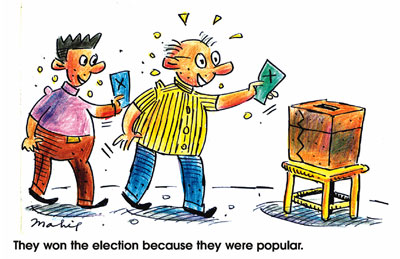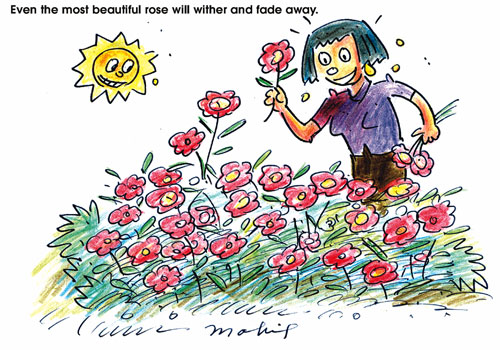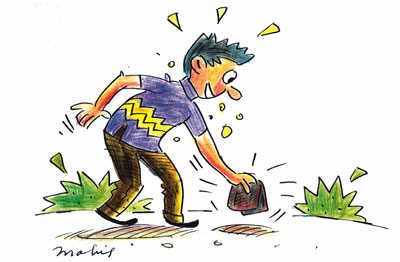|

by R. S. Karunaratne
Adverbial clauses with ‘because’ and ‘although’
We use an adverbial clause with ‘because’ when we wish to give the
reason for what is happening in the main clause. An adverbial clause
with ‘because’ answers the question ‘Why?’
They won the election because they were popular.
I cannot attend John’s wedding because I am leaving for Canada.

I did it because the manager told me to.
She didn’t come to office because it’s her day off.
We didn’t vote for the XYZ party because it had no charismatic
leader.
Like the relative clause, the adverbial clause is also a kind of
subordinate clause.
My grandfather cannot work now because he is very old.
I was happy because I got through the examination.
You delivered your speech well because you had come prepared.
We like vegetarian food because it is healthy.
We don’t feel hot because a fresh breeze is blowing.
Note: We do not use ‘it’s’ before an adverbial clause beginning with
‘because’.
Don’t say: We are happy here it’s because they pay us well.
Say: We are happy here because they pay us well.
We do not use ‘of’ after ‘because’ when it is the beginning of an
adverbial clause.
Don’t say: We love this country because of the people are friendly.
Say: We love this country because the people are friendly.
[Although]
We use an adverbial clause beginning with ‘although’ to show that
what is happening in the main clause cannot be changed.
He didn’t succeed although he tried hard.
My grandmother is healthy although she is in her 90s.
Her boss is a kind-hearted man although he looks serious.
Amanda didn’t win the prize for dancing although she practised
regularly.
Rex continued to run although he was tired.
I ate some curd although I was not hungry.
[Activity]
Fill in the blanks with ‘because’ or ‘although’. Check your answers
with the key.
1. The teacher was disappointed ..................... all her
students failed the examination.
2. Jackson remained calm ....................... he saw an armed robber
in his house.
3. I am proud of her ................. she has planned everything for
the trip.
4. Some people do not like Chinese food ................. it is oily.
5. The players didn’t want to go home ................. it was late.
6. She didn’t feel uncomfortable ................... her host was rude.
7. The project was a success ................ we worked hard to complete
it.
8. He kept on driving ..................... the road was not clear.
9. I prefer snail mail ................... e-mail is cheaper.
10. Sam won the speech contest .................... he had prepared
well.
[Key]
1. because
2. although
3. because
4. because
5. although
6. although
7. because
8. although
9. although
10. because
English proverbs explained
A proverb is a popular short saying with words of advice or warning.
Proverbs usually consist of concentrated folk wisdom. Add the following
proverbs to your knowledge bank.
1. The fairest rose is at last withered

Even the most beautiful rose will wither and fade away. Nothing lasts
for ever.
2.Familiarity breeds contempt
Familiarity or close acquaintance in human relationships may lead to
undue intimacy. A similar proverb is “Respect is greater from a
distance.
”3. A fault confessed is half redressed
If you have done something wrong, admit to it. By doing so, you can put
things right again.
4. Finding’s keeping
If you pick up a purse full of money, it is your duty to hand it over to
the police. However, if you find a ballpoint pen or something not so
valuable, you need not do so. You should have a sense of proportion in
everything you do.
5. Fine feathers make fine birds
A smartly dressed person looks more impressive than he really is.
However, the proverb is used in an ironical sense.
6. Fine words butter no parsnips
High-flown speeches and airy promises are useless substitutes for
actions.
7. Fingers were made before forks
It is common knowledge that people used their fingers for eating before
forks were invented. The proverb is used as an excuse when someone wants
to use their fingers instead of a fork.
8. First catch your hare
We should not decide what to do with a thing until it is in our
possession.
9. First come, first served
Whoever who comes early gets a better choice.
10. First impressions are most lasting
The impressions we make when we meet a person for the first time will
last for a long time.
11. The fish will soon be caught that nibbles at every bait
We should not be too curious or inquisitive about anything.
12. Fling dirt enough and some will stick
When we tell lies about a person, some of them will be believed by
others.
13. A fool and his money are soon parted
A wise man spends his money prudently but a foolish man spends all his
money and soon becomes poor.
14. Fools rush in where angels fear to tread
Foolish people act hastily but wise men will not do so. Angels are wise
people.
15. Footprints on the sands of time are not made by sitting down.
We should try to do something so that we will be remembered by those who
come after us.
Starters:
How to use ‘both, either, and ‘neither’
We use ‘both, either’ and ‘neither’ to talk about two things or
people.
[Both]
We use ‘both’ when we refer to two people or things together.

Both my brothers are lawyers.
Eva wrote only two novels and both of them won awards.
Both Ravi and Jackson have black hair.
Semini has two daughters and she loves them both.
Both men and women stood in the queue to buy bread.
Sometimes we feel happy and sad both at the same time.
How many of us listen to both sides of an argument?
Keep both hands on the steering wheel when you drive.’
Both’ usually goes directly before the main verb in a sentence.
My sisters both live in Bangalore.
Sometimes we use ‘both’ before the subject of the sentence.
Both my pets died yesterday.
However, if the main verb is a ‘be verb’, ‘both’ usually goes after
it.My sisters are both medical students.
[Either]
We use ‘either’ in negative sentences instead of ‘also’ or ‘too.’
I don’t smoke and my son doesn’t either.
A: I have never been to Malaysia.
B: I haven’t either.
They sell nutritious food and it’s not very expensive either.
We use ‘either’ when there is a choice between two possibilities.
Either of you will be suitable for the job.
A: Do you prefer cricket or volleyball?
B: I don’t like either.
A: Would you like plain rice or fried rice?
B: Either will do.
You can go to Colombo either by train or bus.
In either case it’ll take one hour.
We can either relax in the room or go for a walk.
Either you take it or leave it.
Sometimes ‘either’ means ‘both’.
There are trees on either side of the river.’
Either...or’ is used when there is a choice between two different plans
of action.
You can either sit the examination this year or next year.
You can either wait for me or go home alone.
[Neither]
‘Neither’ means not either of two things or people.I have two mobile
phones but neither works properly.
Neither of his parents likes him.
A: Which one do you prefer?
B: Neither.We use ‘neither...nor’ when we want to say that two or more
things are not true.
Neither my brother nor my sister did higher studies.
[Activity]
Fill in the blanks with ‘both, either’ or ‘neither.’ Check your
answers with the key.
1. The principal has two daughters. ............. are students.
2. There were two paintings at the exhibition. I didn’t like
..................... of them.
3. It was a lovely cricket match. ................ teams played well.
4. It wasn’t a lovely cricket match. .................. team played
well.
5. A: Are you an Indian or Sri Lankan? B: .................... I’m an
American.
6. I didn’t go to school for two days. It rained heavily on
................. days.
7. A: I have two pens. Which one do you want? B: ................... I
can write with any pen.
8. Natalie invited the two of us to her wedding but ................ of
us went.
9. A: Do you go to school by train or bus? B: .................. I
always walk to school.
10. My brother and I didn’t go to university because ................
failed the G. C. E. Advanced Level Examination.
[Key]
1. Both 2. either 3. Both 4. Neither 5. Neither 6. both 7. Either 8.
neither 9. Neither 10. both
Word building
It is useful to know how to build up word families.
For a start, let’s make adjectives from nouns. Write the relevant
adjectives against the following nouns.
Check your answers with the key.
[Noun] [Adjectives]
....................1. consequence
....................2. continent
....................3. contribution
....................4. control
....................5. cooking
....................6. correction
....................7. cover
....................8. crime
....................9. crowd
....................10. cry
....................11. culture
....................12. custom
....................13. damage
....................14. danger
....................15. darkness
....................16. date
....................17. decision
....................18. depth
....................19. defeat
....................20. defence
....................21. demand
....................22. democracy
....................23. description
....................24. desire
....................25. development
....................26. difference
....................27. direction
....................28. disaster
....................29. discipline
....................30. distance
...................31. divorce
....................32. doubt
....................33. dream
....................34. dress
....................35. drink
....................36. driver
....................37. earth
....................38. east
....................39. economy
.....................40. education
[Key]
1. consequent 2. continental 3. contributory 4. controlling 5. cooked
6. correct 7. undercover 8. criminal 9. crowded 10. crying 11. cultural
12. customary 13. damaging 14. dangerous 15. dark 16. dated 17. decided
18. deep 19. defeatist 20. defenceless 21. demanding 22. democratic 23.
descriptive 24. desirable 25. developed 26. different 27. direct 28.
disastrous 29. disciplinary 30. distant 31. divorced 32. doubtful 33.
dreamy 34. dressed 35. drunk 36. driving 37. earthy 38. eastern 39.
economic 40. educated |


